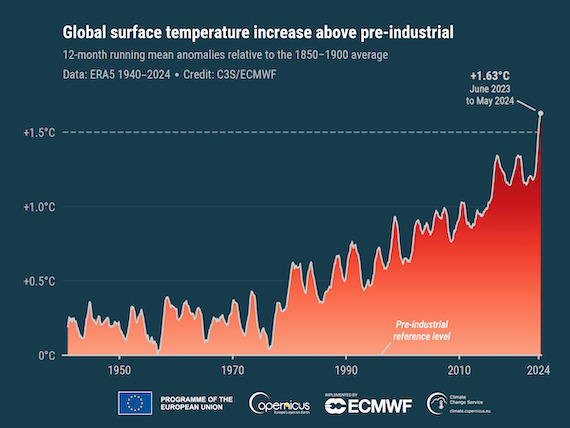Hottest May on Record Completes Gruesome Year-Long Heat Parade
Photo by Saqib Majeed/SOPA Images/Shutterstock
When the records started falling last year, it seemed like more of the same. The hottest June ever recorded, okay; we get those every now and then these days, and if it’s not the hottest then it will be the fourth hottest, or ninth hottest, or 11th hottest.
Hottest July ever recorded (and because July is Earth’s hottest month, the hottest single month in human recorded history). Hm okay, two in a row; people did predict a hot summer, after all. Hottest August on record. Well, might as well complete the trilogy.
This couldn’t continue, just logically and statistically speaking. Weather is still a thing that happens, and varies, and there can still be a cold streak here and there, even on a warming planet in an El Niño year.
Nope. September (the world’s most anomalous month ever seen, meaning the biggest departure from average), October, November, December — none all that close, comfortably closing out the warmest year in the temperature record dating back to the 1800s and probably back more than 100,000 years.
Not done yet. Each of the first four months of 2024 also shattered their own records, even as the warming El Niño began to fade and the cooling La Niña approached. The mercury stayed stubbornly up above existing lines, a grim reminder of the hot water in which the world is now swimming.
And now we have completed the cycle: the E.U.’s Copernicus Climate Change Service reports that May was also the warmest such month globally. (NOAA, NASA, and other agencies will follow with their own reports, but they are usually in solid agreement.)
This means that the 12-month average temperature since last June actually exceeded the 1.5-degree Celsius threshold set forth in the Paris Agreement: the globe was 1.63 degrees C higher than the pre-industrial average. This is very grim.

“It is shocking but not surprising that we have reached this 12-month streak,” said Carlo Buontempo, the Climate Change Service director, in a press release. “While this sequence of record-breaking months will eventually be interrupted, the overall signature of climate change remains and there is no sign in sight of a change in such a trend.”
The next test will be whether all those fallen records stand for even a single year. La Niña is expected this year, so the streak of hottest months will likely fall at some point. But even that will be temporary on our current trajectory.
“This string of hottest months will be remembered as comparatively cold,” Buontempo said. “But if we manage to stabilize the concentrations of GHGs in the atmosphere in the very near future we might be able to return to these ‘cold’ temperatures by the end of the century.”